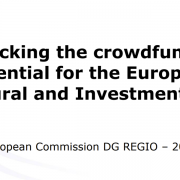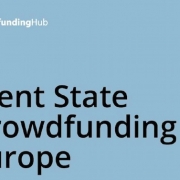Current State of Crowdfunding in Switzerland 2016
An overview

Inhabitants: 8 million, GDP (ppp) per capita: $58,731
The Swiss crowdfunding market is relatively young and small compared to other countries. Interesting though, the market is growing and more platforms emerge. Foreign platforms recently enter the Swiss market. There are currently nearly 40 platforms in Switzerland. The development stages of crowdfunding in Switzerland are similar as in other countries. Firstly we saw new platforms emerging. Also different types of crowdfunding emerge e.g. reward, lending, equity, and donation. Combinations are possible in the feature as well. The market is early stage, developing and experimenting what works and what not. It is a very interesting fact that a large amount of Swiss investments via crowdfunding platforms are made abroad.
Volumes (2014)
- Donation based: no data available
- Reward based: CHF 7,7 million (€7 million)
- P2P consumer lending: CHF 3,5 million (€3,2million)
- P2P business lending: not data available
- Equity based: CHF 4,6 million (€4,2 million)
For 2015 the volumes are expected to have doubled.
Local platforms
There are nearly 40 platforms, some well known are:
Wemakeit is an artists’ initiative founded in 2012 in Switzerland, now also present in Germany and Austria. It welcomes culture, creative, tech, science, journalism, community and agriculture projects.
investiere.ch, an equity based platform that combines best practices of traditional venture capital with e- finance.
Foreign Platforms
The following platforms are the most actives ones in Switzerland:
Indiegogo and Kickstarter
Seedmatch, a German funding platform that does seed and private equity investments.
Regulations
In terms of regulations, Switzerland does not have a specific crowdfunding ruling established. Today, mainly banking law applies. However, as the crowdfunding market continues to growth, it is more likely that Switzerland will adapt or create crowdfunding regulations. That in fact has become very dynamic recently. There are discussions between the industry and Swiss financial regulation institutions and authorities.
Most recently the FINMA accounced: “FINMA encourages innovation and competitiveness in the Swiss financial marketplace” by setting a Fintech-friendly environment and reducing obstacles for FinTechs (www.finma.ch.authorisation/fintech). Also the support from the politics seems to fuel the initiative. The main regulative obstacles for crowdfunding are: keeping the money on behalf of the borrower during the fundraising period for more than a week, having more than 20 investors (lending, equity).
Banks
Many banks have peer-to-peer finance on the watch list, some ignore the topic, and a very few actively dive into the deep water. This is not surprising. However, the approach differs. The common pattern seems to be that banks do not fully engage into crowdinvesting/lending yet. This may be due to regulation but also due to reputation and the risk associated with it. However, currently the entry point for banks is reward based crowdfunding. The driver here is a pure marketing perspective as well as to gather first experience. As of the beginning of 2016 Switzerland has three banks with a crowdfunding platform. But more will follow. So far there is not a “lending club” model of having many banks participating over one platform. This however could be interesting in particular for smaller banks in order to gain from lower entry costs, efficiency gains, having a greater community and a bigger marketing impact.
Our expert

“What if peer-to-peer finance becomes the prefered method of finance for SMEs combined with a strong marketing aspect?“
The Current State of Crowdfunding in Swiss is made possible by the contribution of Andreas Pages
What is the potential of crowdfunding in your country?
There is huge potential for crowdfunding in Switzerland. Mainly the area of crowdlending for small and medium sized businesses and property crowdfunding as well as donation based crowdfunding for NGOs seem to be next likely developments on the Swiss market. The opportunity for SMEs in Switzerland will be to use crowdfunding as an alternative way for investment, as well as having a marketing platform (proof of concept). This is in particular true for financing below CHF 250,000, as there is a so-called “funding gap”. Another recent development is the discussion with cities about the use of crowdfunding as an alternative form of financing. In general you will find in Switzerland a lot of industries use crowdfunding and experimenting. Some of the most promising industries are property, startups, as well as arts and culture.
What is the future holding for Switzerland?
Certainly Switzerland may benefit from the second mover advantage, the good economy as well the fact that Switzerland is regularly one of the top ranked innovative countries.









